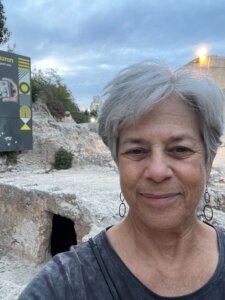Jane Petkofsky of Arlington, Virginia, said she arrived in Jerusalem last week to begin a weeklong vacation in the holy city with a friend when the attack by Palestinian militant group Hamas started Friday night.

Petkofsky said the first sirens roused them on Saturday morning and everyone in her building headed into the basement for shelter. Since warning sirens are not unheard of in Jerusalem, the “level of alarm” initially wasn’t high, but once they emerged from the shelter there was a desire among people to know what was going on.
The attack happened on the Sabbath, a day when many Jewish people refrain from using technology such as cellphones, but after the siren, she said her host allowed for an exception. That’s when they realized what was unfolding.
Then, the second alarm sounded.
“There was another siren with multiple explosions,” Petkofsky told WTOP.
Those explosions were missiles being shot out of the sky over Jerusalem.
Since the initial sirens, they have fled several times to the shelter. Petkofsky said they were told to move fast because once a siren sounds, they have only a minute and a half to get to safety.
“It’s just horrible and everything is just so uncertain,” she said.
She said the concern of hostages being taken led to their decision to stay mostly in their building and not travel around the city. She said she and her friend spent a whole day walking near where they were staying, and described Jerusalem as a ghost town.
“It is quiet, quiet, quiet,” she said. “The schools are closed, most businesses are closed.”
Petkofsky served as counsel to the Supreme Court on Sept. 11, 2001, and recalls driving by the Pentagon after it had been hit and seeing the area in the days that followed. She said that’s what Jerusalem feels like today.

“The anxiety of not knowing what comes next. Because that was true in 9/11, too. You didn’t know what else was planned,” she said.
In between the sirens and evacuations to a shelter Monday, Petkofsky worked to book earlier flights back to the United States. She said while very expensive, they booked two flights, days apart, so if one is canceled, they’ll have another option.
Several airlines have announced they are no longer flying to Israel.
“Right now, I would rather be [home],” she said.
She said one other big concern is the need to drive to Tel Aviv to get to the airport as more airstrikes and hostage taking are possible.
“I can’t think of anything more terrifying than that. I mean, frankly, I would rather just lose it in a missile strike,” she said.
As she hopes to make it out of the area by next week, she plans to stay mostly inside in the meantime.
She also said she is working to cope with the gravity of what is taking place.
“My heart is just breaking for all the loss of life and for the hostages,” she said.
WTOP’s Sandy Kozel contributed to this post.








